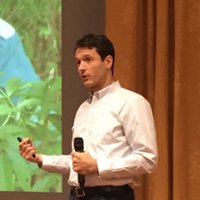
John Hoddinott
@johnhoddinott6
ID: 1486346240757534720
26-01-2022 14:32:25
50 Tweet
236 Followers
71 Following

Great tips from David McKenzie (per usual): A crowd-sourced checklist of the top 10 little things that drive us crazy with regression output blogs.worldbank.org/impactevaluati… via @worldbank


Measuring harassment in the workplace: Kathleen Beegle summarizes work by Laura Boudreau @SylvainChassang Ada González-Torres🇺🇦 & @RachelMHeath on testing methods to better elicit sensitive information such as "hard garbling" where some responses are randomly flipped blogs.worldbank.org/impactevaluati…




Can AI write your Stata code? In today's Development Impact post, Owen Ozier provides good news for the job security of Stata RAs everywhere as he tests ChatGPT (which seems to be better at R than Stata). blogs.worldbank.org/impactevaluati…


Econ PhDs are struggling with symptoms of anxiety and depression at rates more than twice that of the general population, says Valentin Bolotnyy🇺🇸🇺🇦 of Stanford University. We spoke with him about why that is and what can be done about it. #ResearchHighlight aeaweb.org/research/menta…


Come to the Barcelona School of Economics Development Economics Summer School, featuring me and Pamela Jakiela! Take our midday class, and throw in Jeffrey Wooldridge's AM panel data class, or Paul Milan's on networks! See Libertad González and Joan Llull (Econ) in Labor economics! bit.ly/3YXmvaT


Nice post today by Kathleen Beegle summarizing an EDCC paper by Mark Treurniet on how being part of a baseline survey increases farmers take-up of a new agricultural technology: i.e. doing a baseline can affect estimated impacts blogs.worldbank.org/impactevaluati…

Does the UN UN JP Rural Women’s Economic Empowerment reach, benefit, #empower #women & transform #gender relations? See our multi-country study in 🇪🇹🇰🇬 🇰🇬🇳🇪 TL, DR: yes, in some cases but watch out for workload impacts. Ruth Meinzen-Dick Dr Hazel Malapit (she/her) Dr. Jessica Heckert CGIAR GENDER authors.elsevier.com/a/1g-tt7sxZ~Fq…






A new method for measuring food insecurity developed by Cornell Dyson & Nutritional Sciences at Cornell researchers found that between 2001 - 2017, 1/3 of US households experienced at least temporary food insecurity. 🧵#NIFAImpacts Economic Research Service news.cornell.edu/stories/2023/1…

